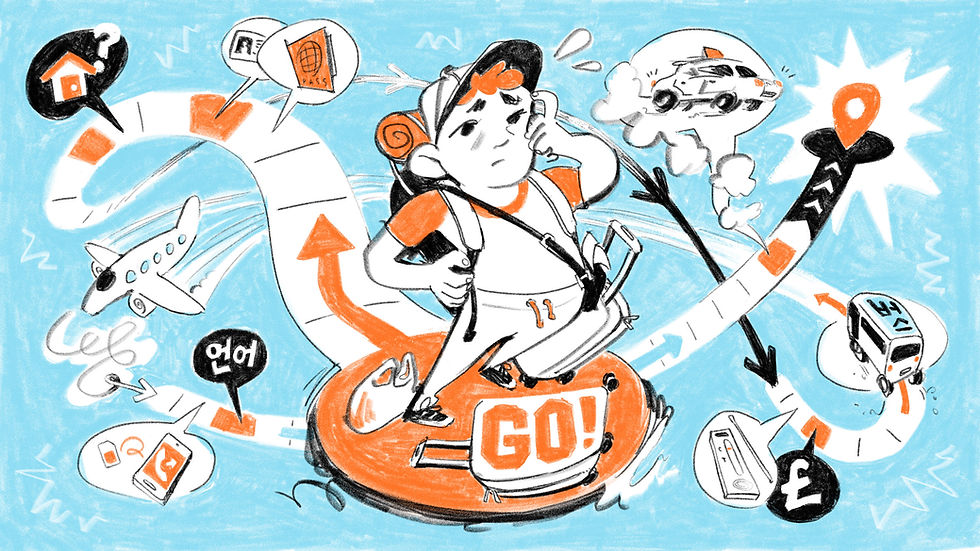Wait…What Can I Put in My Carry-On, Again? A Travel Checklist for Going Abroad
- Georgina Burt
- Sep 26, 2022
- 5 min read
FCDO student ambassador for the University of Edinburgh Georgina Burt takes us through all of the tips and tricks needed for going abroad:

Artwork by Kate Granholm (IG: @katesartthings).
For most of us it has been a while since we have experienced those surreal drives to the airport in the very early hours of the morning when the world is seemingly dead. Thankfully, with most countries having reopened their boarders and easing their COVID restrictions, things are back in full swing within the travel sector again and those delightful, groggy 4am wakeups are no longer just nostalgic memories of the past.
Of course, while going on holiday is generally for the purpose of relaxing, I’m sure that we can all agree that sometimes getting organised beforehand can be a stressful ordeal. From picking out which clothes to take to sorting out all the logistics of food, accommodation, and transport in a distant location you have never once stepped foot in. Luckily, for those about to embark on their ‘study abroad’ programmes, gap years, or summer getaways who are feeling a little bit rusty when it comes to preparing for a trip, #TravelAwarehas made travelling easier than ever!
Based on my recent experiences travelling after the pandemic, here are some great tips on getting organised before going abroad:
CHECK THE ENTRY REQUIREMENTS
Before finalising your destination, it is wise to double check that you can meet all the criteria necessary to enter your chosen country. This ‘criteria’ may include an array of mandatory vaccinations, visas, and in recent years, covid tests, tracing apps, and passenger locator forms.
The last thing you want to do is be denied boarding at the gate after having it sprung on you that you are missing documents!
Fortunately, you can actually check the entry requirements for any country here, as the FCDO’s pages have kindly laid out all the fundamental information you will need for your trip. Make sure you use them to brief yourself on the local laws and customs of your destination also, so that you are aware of how to be respectful of your surroundings and avoid getting into trouble! For example, did you know it is illegal to bring e-cigarettes into Thailand or Australia?
Top Tip: It is common procedure for most countries to deny you entry if you cannot demonstrate evidence of a return or onward journey ticket!
2. BUY TRAVEL INSURANCE
Undeniably, this is not the most exciting step of the pre-departure process… However, travel insurance is crucial for providing you with a parachute in case of emergencies abroad.
So, how do I know which travel insurance is appropriate for me?
Luckily, the FCDO’s advice pages can help you assess which insurance plan is best for you!
As an overarching general rule though, it is imperative to be covered medically for any travel. Typically, you should also buy an insurance plan tailored specifically to the needs of your trip, such as coverage for winter-sports, outdoor activities, or water sports, and it is recommended to have all gadgets and valuables covered in case they get stolen or damaged abroad.
Personally, I would highly recommend having an insurance plan to cover you for any covid-related incidents or travel disruptions as you can be offered compensation or alternative means of transport if necessary.
Top Tip: In the post-Brexit world we now live in, you are entitled to a shiny new G-hick card once your old E-hick has expired! This will cover you for medical emergencies abroad, (however it is still highly advisable to purchase travel insurance alongside it, as these cards are limited in their coverage.)
3. CHECK YOUR PASSPORT IS VALID
Don’t be fooled! This seems like a silly one, but your passport doesn’t necessarily need to be expiredfor it to be considered invalid. Many countries require that passports have at least 3-6 months left before expiry – but it’s best to double check this using the FCDO’s travel advicepages.
So don’t get caught out, as Emergency Travel Documents are extremely expensive (and stressful) to get your hands on!
Top Tip: Be sure to take photocopies of your passport with you abroad. These are valuable to confirm your identity if requested by local authorities abroad, at checkpoints, or in the instance your real documents are misplaced or stolen.
4. DON’T FORGET THE LITTLE THINGS
While there are so many parts that go into planning your trip, it is important to plan ahead for the little things too! For example, be sure to familiarise yourself with which currency you will need while abroad and be sure to get some cash exchanged into that currency. This is helpful not only to avoid racking up exchange charges just from tapping your card, but also, a lot of small markets and towns abroad tend to only accept cash! Additionally, from personal experience, it is handy to find out whether your phone plan still offers EU data roaming after Brexit – to my surprise, one morning my phone plan cut me off which became a huge inconvenience while studying abroad. If your trip is long enough it may be worth purchasing a pay-as-you-go sim abroad.
5. THE AIRPORT
It’s been a few years now since COVID, so it’s fair to say that we are all a little bit rusty when it comes to remembering the proper airport procedures. Airports can be really stressful sometimes, especially when it is busy during the holiday seasons, so here are just a few little things to remember to make the process run smoothly for you:
● Check-into your flight online the night before and download your boarding passes! – I very narrowly dodged a €155 penalty recently for not doing this…not recommended. This is handy to not only reduce the amount of waiting time in queues at the airport the next day but alsosome budget airlines can charge fines for not doing this.
● It’s recommended to show up to the airport 2 hours before a domestic flight and 3 hours before an international flight – don’t underestimate how busy the airport will be!
● Liquids in hand luggage must not exceed 100ml each and must fit into one clear plastic bag – this includes makeup, creams, and perfumes.
● Remember to take off jewellery and belts for the metal detectors in security to avoid the trouble of beeping and getting searched.
Once you have made it this far, I’m glad to tell you that you have officially completed your pre-departure checklist! All the intensive preparation has finally been completed, allowing you to throw yourself into your trouble-free holiday paradise!
Now, while all these little steps are a bit of a bother, I’m sure we can all agree it’s worthwhile to plan ahead so that once you reach your destination, you can unwind knowing everything has been taken care of in advance. Planning and preparing for the worst isn’t the most fun at the time, but in the long-term actually enhances your holiday experiences by lifting the burden of your worries wile abroad. So, for anyone feeling a little bit overwhelmed trying to get the most out of their trip abroad, be sure to check out the FCDO’s advice page for more information like this to help you plan your trip and make everything a lot less stressful.
*Georgina is currently working as the FCDO student ambassador for the University of Edinburgh, seeking to promote the UK Government's TravelAware campaign to the Edinburgh community.
References:




Comments